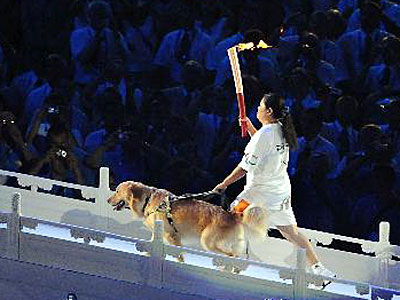|
 |
|
Ping Yali and her guide dog Lucky at the opening ceremony of Beijing Paralympic Games on September 6, 2008 (Xinhua) |
China has begun introducing access signs for the disabled based on internationally-recognized symbols.
Bai Dianyi, head of the basic standardization research center, at the China National Institute of Standardization, which oversaw the drafting of the signs, said Sunday the 15 symbols appeared on the first batch of public information graphical signs in China on January 1.
"We have borrowed ideas from symbols in countries such as Britain, and our symbols are geared to international standards," said Bai.
The symbols include those for guide dogs, for telephones for people with hearing and speaking problems, and for access for the physically-impaired. They also serve the elderly, the injured and the ill.
Bai said the symbols can be colored to accord with the surroundings. "But they can't be red or yellow, as they would look like warning signs."
Ping Yali, a former Paralympic athlete, who is visually impaired and travels with her guide dog, Lucky, said, "The symbols are not only helpful as public signs, but make us feel equal in public places.
"I can't believe the change. I went to a temple fair on the lunar New Year's Day, and there are special passages for me and Lucky," said Ping, the champion of B2 long jump with 4.28 meters in the 1984 Paralympics.
"But I am worried that some people will regard the symbols as new barriers for us, as they may believe we cannot go to the places without those symbols."
Ping also worries about Lucky's legal status. The golden retriever led Ping as she passed the torch at the Beijing Paralympics' opening ceremony.
She received a temporary certificate to have Lucky in public places during the Olympics, but it expired on September 20, 2008.
"I do not know whether it's legal or not to keep Lucky because there are no accredited organization for guide dogs in China, and he is bigger than Beijing's limit of 35 cm high. He is a big boy of 80 cm," said Ping.
"It is heart-wrenching when people turn him away when he is guiding me on to buses and into theatres, because they think he is illegal."
(Xinhua News Agency February 2, 2009) | 